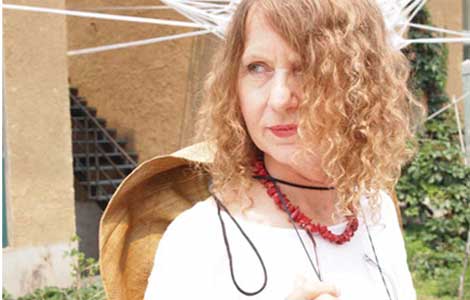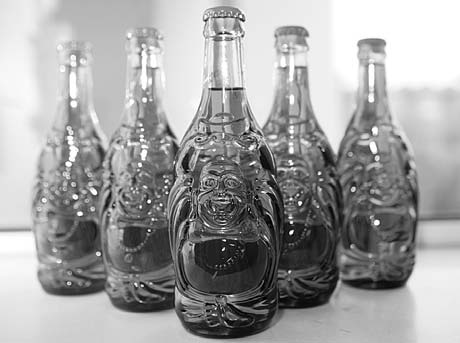Delicacies
Get lucky with this beer
Updated: 2011-08-07 07:46
By Mike Peters (China Daily)
|
Buddha-shaped bottles are becoming a hit at bars around the world. Guan Xin / China Daily |
We hear of food that travels, but here's a beer that's been down under and back, as Mike Peters finds out.
I suspect the sight of every beer bottle I've ever encountered has made me smile - but thanks to a father-and-son team in Australia, there is a Chinese beer that grins back at me.
The brand is Lucky Beer, an immediate standout on store shelves because the green glass bottle is unexpectedly shaped like a seated, laughing Buddha, holding a large, gold ingot above his head. The brew's name is reinforced by four Chinese good-luck symbols (good fortune, happiness, longevity and prosperity) on the bottom of the bottle.
"The idea was born about six years ago," says Charles Smouha, whose father Philip "wanted to put a smile on your face just by looking at the bottle." The younger Smouha, who runs the beer company while his father runs a fashion "rag-trade" business, says Lucky has been a strong brand thanks to the iconic container, but he notes that the cool bottle may only be good for one sale.
"Beer drinkers buy beer for the beer at the end of the day," he says. "So you can't have a bottle that good without something good inside."
The sudsy crowd at the recent Beijing Beer Festival seemed to agree. Brandon Hess, who represents distributor Dxcel in the Chinese capital, says Lucky Beer's cheerful countenance drew a crowd to his booth that kept coming back for more.
The flavor profile was developed in Australia, says Smouha, but refined once the company began production at Qiandao Lake near Hangzhou.
"It's an Asian-style lager, like Kirin, Tsingdao, Singha," he says. "It's light, dry, crisp, made with rice as well as the traditional barley and other ingredients, including our own Chinese hops. It's fantastic with Chinese food and spicy foods. Not heavy like Australian beers, or something like Duvel, not so hoppy. It compliments Asian cuisine very well."
Brewed by Hangzhou Qiandaohu Beer Co, the marketers' allusions to a beer brewed at a "lake of a thousand islands resonates with Western consumers - currently about 95 percent of Lucky's customer base worldwide. US brewer Hamm's celebrated lagers "from the land of sky-blue waters" while the slogan "brewed with pure Rocky Mountain spring water" drove Coors to prosperity for 50 years.
Such happy imagery sometimes gets lost in translation when it crosses a cultural divide. A more recent Coors slogan used in the US, "Get loose with Coors," famously became "Get the runs with Coors" when translated into Spanish for billboards aimed at the Hispanic community. The seemingly placid "Coke adds life" campaign shocked consumers in Japan when it was rendered "Coke brings your ancestors back from the dead". And in China, KFC's "finger-lickin' good" lacked appeal in Chinese characters that meant "eat your fingers off".
Could Lucky's light-hearted use of the image of the Buddha be similarly off-putting?
Smouha doesn't think so.
"The brand is happiness and good fortune. We've experienced no negativity to date, and we've trademarked the brand the world over. So far, it's only positive feedback.
"I think it would be quite different if we put Jesus on a bottle," he says, "not that we would go down that path."
The Enlightened One, of course, has been to bars before. White ceramic drinking cups cast in the same "joyful Buddha" image are popular in Chinese-style and Hawaiian restaurants around the world. Fruity concoctions slosh around the big belly of house-special cocktails at popular bars from LA to Beijing without seeming to raise hackles.
However, Buddhists who aren't in bars sometimes see things differently.
"Of course the design is disrespectful towards Buddhists," says Xian Jia, 38, a monk in Beijing's Longquan Temple. "After they drink the beer, the bottles will be discarded and shattered. I have seen some other products with a Buddha image, like some medicine.
"However, the Buddha-shaped beer bottle is worse, because the alcoholic drink contradicts Buddhism. The businessmen just want to make money out of the eye-catching design and don't care about the religious implication.
"I don't think it is a rare phenomenon" to use the Buddha's image for a promotional purpose, he says, "but there is no way for us to force them to change."
Dong Chunxi, 48, a male lay Buddhist, can see both sides.
"Apparently, religious people are not happy to see this," he tells China Daily. "It doesn't show due respect to Buddhism.
"However, I can understand the designers to a certain degree. The Maitreya Buddha has a big smile and a big belly; it looks very funny. For those who are non-religious, they just find the image very adorable and don't strongly connect it to Buddhism. If you look at it in this way, it may be easier to accept."
Dxcel's Hess, who has sold the product to about a dozen bars in Beijing after Lucky Beer was launched earlier in Shanghai and Hong Kong, recognizes that it's a problem for many when the bottle becomes trash in the image of Buddha.
"I can tell immediately when I'm calling on customers who are Buddhist," he says. "They usually like the product, but they worry about what happens to the bottles later."
Em Harris, a graduate student from the UK, frequently drops in at Beijing's Heavenly Store since she found Lucky Beer there. She doesn't see the problem.
"Who on Earth would throw that bottle away?" she asks, jiggling a tote bag with a couple of empties in it. "People buy it because they want the bottle, right?"
Tang Yue contributed to this story. You can contact the writer at
michaelpeters@chinadaily.com.cn.

Specials

Beer we go
Early numbers not so robust for Beijing's first international beer festival

Lifting the veil
Beijing's Palace Museum, also known as the Forbidden City, is steeped in history, dreams and tears, which are perfectly reflected in design.

Allure of mystery
China continues to be a place of fascination for traveling artists from around the world.
